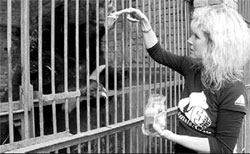| Home / Living in China / What's New | Tools: Save | Print | E-mail | Most Read |
| Englishwoman's Dedication Helps Moon Bears Find Refuge |
| Adjust font size: |
About 175 Asiatic black bears live at the
Robinson now lives in Robinson told Impact Press four years ago that one less agitated bear in a small cage stretched its paw toward her. Without thinking, she reached out and held it for several moments, feeling the large paw rhythmically squeezing her fingers. "I truly believe this bear reached out to me for a purpose," Robinson was quoted as saying. "It's a moment I will never forget." Founded by Robinson, the The moon bear is one of only eight bear species in the world and one of the five listed as endangered, with just a few thousand remaining in Today visitors to the rescue center are impressed by a graveyard with 43 tombs in one corner. "Whenever a bear dies in the center, the staff hold a memorial before cremating and burying them in the graveyard," Wu Jianguo, one of the bear keepers, told China Daily. "I've participated in a dozen ceremonies since I began working at the center in late 2002." Participants in the ceremony pray for the deceased bear and sing its praises before cremating it with its favorite food and toys. According to Wu, one reason for cremating the bears is to ensure that no part of them will be used for food or medicine. "For example, Chinese have long believed that bears' paws are tonics," he said. Also, bile used to be extracted from the bears for centuries, but now scientists have developed herbal and synthetic alternatives. Since the center's founding, progress has been remarkable. Relying solely on donations, the 13-hectare center with a staff of 140, most of them locals has rescued 218 bears from the bear farms. The bears live in spacious, nature enclosures, have cozy dens to retire to at night and eat decent food. What is more important, they are free from physical and mental pain of bile extraction. According to Rainbow Zhu, public relations officer at the center, an average of two foreign volunteers work there each year. Usually committing to a three-month stay, they not only have the opportunity of working with a truly majestic endangered species, but also immerse themselves into a completely different culture thousands of miles from their homes. (
|
| Tools: Save | Print | E-mail | Most Read |
 |
| Related Stories |
|
